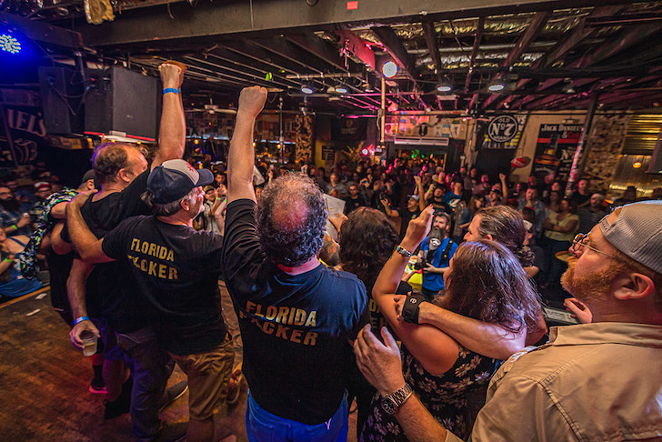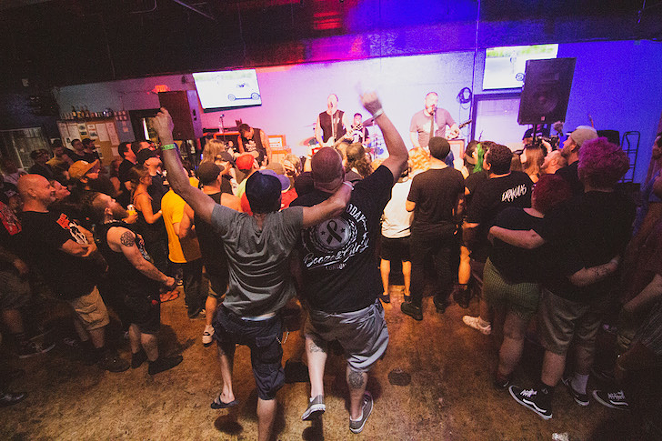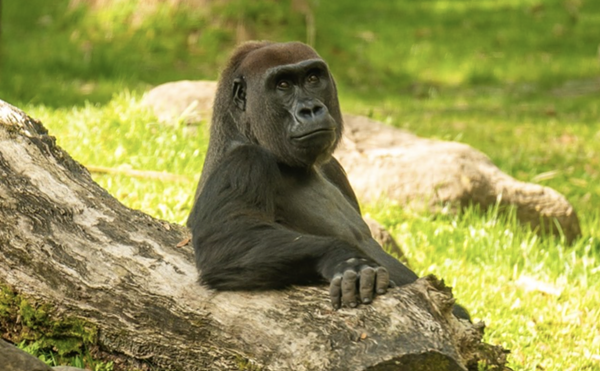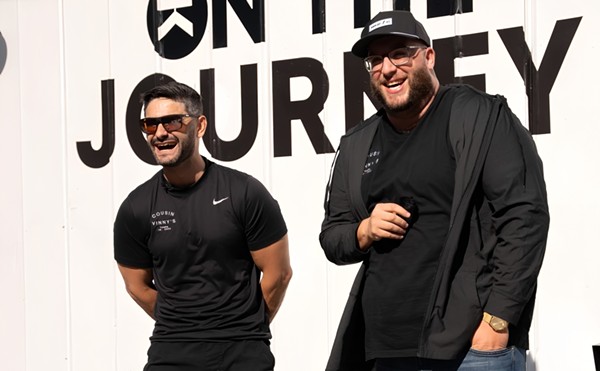
In March 2020, the music section of Creative Loafing Tampa Bay was a collection of stories about concerts, local and otherwise, that were still on “despite coronavirus concerns.” Before the month was over, the headlines shifted. An avalanche of concert postponements and cancellations followed along with news about record shops providing curbside pickup and all the sets local music fans could livestream.
Sadly, memoriams for Florida musicians who died from COVID-19 (DJ Griff Gotti, an alum of Ol’ Dirty Sundays) or were in critical condition after contracting the virus (part-time Gulfport resident John Prine, who passed on April 7) also found the page.
One big local story dropped in April (Downtown St. Petersburg’s State Theatre was renamed “Floridian Social Club”), but May was still mostly more arena and stadium show cancellations and postponements (Guns 'N Roses, Nickelback) and loud reminders that Tampa Bay’s independent live music venues were probably going to wither away on the vine without federal aid.
RELATED
Tampa Bay’s independent live music venues aren’t getting federal help and they might not survive
But it’s no secret that Florida didn’t stay closed for very long; to the state, the bottom line took precedence over the safety of residents, and without proper relief funding, venues almost had no choice but to play along.
Come July and August, spots like Largo Cultural Center and New World Brewery were holding outdoor concert series. In September, Cheap Trick’s Robin Zander played three reduced-capacity, socially-distanced shows at Ruth Eckerd Hall. Sister Hazel booked a drive-thru concert at Raymond James a month after that.
By December 2020, Tampa Bay's live music scene had withstood the pandemic, was booking buku—mostly masks-required—local concerts, and staring at a very uncertain future with the national touring industry still firmly on hold. Dance floors were even banned in Hillsborough County in an attempt to curb large gatherings (enforcement was lukewarm at the very best).
When Super Bowl LV weekend rolled into town, CL counted nearly 40 concerts that popped up out of thin air—from big game bashes with Gucci Mane, Flo Rida and Migos to small venue sets with local DJs. (I talked to music industry folks in L.A. the day after the Bucs won, and you could hear their jaws drop on the floor when I told them about the volume and nature of the concerts.)
For its part, CL started wading back into weekly live music previews around Thanksgiving and had revived a slimmed down version of “Music Week” before ringing in 2021.
Now, at Tampa Bay’s largest venues—Amalie Arena and MidFlorida Credit Union Amphitheatre—big ticket shows from John Mayer to Rod Wave are slowly coming back to the schedule. There was even a controversial Teenage Bottlerocket concert where un-vaxxed ticket buyers had to pay $999 to get in. Festivals come roaring back in October. Relatively smaller clubs like Jannus Live have picked up huge acts (The Black Keys) and indie-darlings alike (Tennis, Thundercat) all while beloved local haunts like Hideaway Cafe, Crowbar, Hooch and Hive, and New World Brewery continue to mostly rely on strong local bills to keep their calendars robust.
With national tours starting to warm up to Florida, CL’s live music preview section may have to expand again. And while the live music scene is restarting in a big way, we should all resist the urge to say that “live music is back.”
“I feel like people are already taking things for granted even though we're still wounded. We are wounded animals right now,” Tom DeGeorge, owner of Crowbar in Ybor City, told CL. “I am afraid to smile when people say ‘You’re back!,’ because I don’t want people to think we’re back. The moment you start thinking everything is OK, we stop fighting.”
To the casual observer, it’d be easy to peg DeGeorge as a pessimist, but it’s not hyperbolic to say that since the onset of the pandemic, his efforts locally—and, more importantly, together with the newly formed National Independent Venue Association (NIVA)—helped take the next step towards saving the American live music industry.
To make a long story short, I’ll refer to reporting from former CL music critic Eric Snider who wrote this just before Christmas last year:
Against all reasonable odds, a diehard group of about 40 independent venue owners and promoters marshalled their energies and got a $15 billion provision included in the $900 billion pandemic relief package that Congress passed and President Trump signed into law. It’s called the Save Our Stages Act, and it just might do what its name promises.
These people, who became instant lobbyists and called themselves “The Fuckers,” did the heavy lifting on behalf of a larger organization, the National Independent Venue Association (NIVA), which hastily formed just a few weeks after the coronavirus shut down live entertainment.
It looks like The Fuckers’ efforts will save many of the small, for-profit venues that have been hanging on by their fingertips for the last several months. The bill also provides much-needed funds for mid-size venues, promoters, theatrical producers, and some museums and movie theaters.
Thanks to more relief funds secured after Joe Biden and Kamala Harris came into office, the Shuttered Venue Operators Grant (SVOG) is now worth over $16 billion.
There’s a reason cable news, plus outlets like the New York Times, Billboard, Time, Variety and more have come knocking on Crowbar’s door to talk to Tom.
On top of that, DeGeorge, who is NIVA’s Florida captain, spoke loudly about his desire to see local and state officials move to not only provide support for venues like his, but to put the safety of the public over a desire to pump money back into the economy. His Tampa-based “Safe & Sound” reopening model was even picked up by the City of Tampa and then the live music capital of America in Austin, Texas.
In June—a month-and-a-half after a glitch stalled the application process—when less than two dozen Florida applicants for the Shuttered Venue Operators Grant had been approved, DeGeorge not only brought attention to the issue, but also helped local operators stay calm and navigate the delay, which he actually anticipated.
“I told people, ‘Don’t be devastated if we don’t get to hit send tomorrow,’” DeGeorge told CL the day the applications went live in April. Even he didn’t get his application through. “I trust the SBA [Small Business Administration] when they say they're going to give us 'ample time' to go through the new FAQ section of the grant application before opening the portal.”
The patience and persistence paid off.
According to the SBA’s July 19 report on SVOG grant progress, nearly 500 venues in Florida have now been approved for more than $377 million in relief. The same report says that in the Tampa Bay area, just under 100 entities have been approved for SVOG funds to the tune of $99 million.
Funds approved were based on loss, and DeGeorge said that nearly every local NIVA member was approved. He’s working to help secure money for the few still waiting, and after that he anticipates that some of the excess funding may be used in an additional round of relief for venues considered eligible entities.
At Hot Dog Party 15 on July 3—the first full-blown live music event I’ve attended at Crowbar since the onset of the pandemic—DeGeorge was surrounded by almost two dozen NIVA “Fuckers” from across the U.S. who’d come to not only strategize, but take a collective breath. He got emotional and told the crowd he was approved the night before.
The SBA report says Crowbar was approved for $278,697 in SVOG relief. Approvals in Tampa Bay ranged from $10 million to $4,884. The average amount awarded to local venues was $1,076,309, but it appears that only Amphitheatre Ybor Inc.—operator of The Ritz in Ybor City—was the only local club or small promoter to get more than $1 million.
Locally, some of the largest SVOG approvals went to entities like Feld Entertainment ($10 million), Ruth Eckerd Hall ($9.3 million), Tampa Bay Performing Arts Center ($8.1 million) and Amphitheatre ($1.4 million).
Most of these funds have yet to be distributed, but DeGeorge said he trusts the process will deliver the relief the way it’s supposed to.
All that said, SVOG funds and a growing concert calendar should not be mistaken for the end of live music’s misery.
As DeGeorge said, not one of these entities, big or small, is out of the woods. As we saw at a recent Foo Fighters’ L.A. show, one case of coronavirus on a tour can lead to a string of postponed (or canceled) dates; compound that into other big tours as well as relatively smaller indie jaunts, and you have another round of weeks and months of empty venues. Tours already famously skipped Florida, but how can live music fans expect a band, its crew and agents to take a chance on a state recently responsible for 20% of all new coronavirus cases in the U.S.?
Still, DeGeorge has simple advice for locals looking to be better stewards of the live and local music scene. “There’s not much we can do, but there are a few things,” he explained.
- Get vaccinated
- If you’re not going to get vaccinated, be careful and wear a mask
- If you don't feel good, stay home
- Don't ask to be on the guest list. “Pay for the shows, the industry and its workers have suffered enough. We need people to pay for the shows and pay for your drinks.”
- Tip
“Just appreciate that it’s back, and don't take it for granted,” DeGeorge said. “We have a long, long road ahead of us.”
That’s absolutely true for an industry that was first to close and last to open, but DeGeorge is committed to making sure no eligible independent venue gets left behind. He wants locals—from venue owners to promoters to music fans—to use their platforms to create change in the community and work hand in hand with city officials “to make them work for us for the proper amount of change.”
“All those things are important. I believe that we are still in a survival phase. And that's why those little things are so incredibly important. Because I do want to survive,” DeGeorge said. “After survival, that’s when we get to the thrive part of things.”
Support local journalism in these crazy days. Our small but mighty team works tirelessly to share music news, events and concert announcements as the Tampa Bay music scene recovers from coronavirus shutdowns. Please consider making a one time or monthly donation to help support our staff. Every little bit helps.
Follow @cl_tampabay on Twitter and subscribe to our newsletter.
















